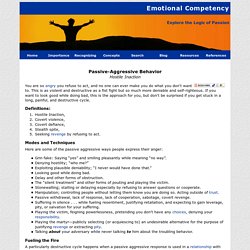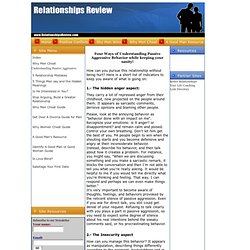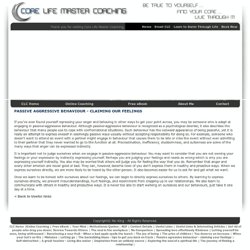

Passive-Aggressive Behavior. You are so angry you refuse to act, and no one can ever make you do what you don't want to.

This is as violent and destructive as a fist fight but so much more deniable and self-righteous. If you want to look good while doing bad, this is the approach for you, but don't be surprised if you get stuck in a long, painful, and destructive cycle. Definitions: Hostile Inaction, Covert violence, Covert defiance, Stealth spite, Seeking revenge by refusing to act. Modes and Techniques Here are some of the passive aggressive ways people express their anger: Grin fake: Saying “yes” and smiling pleasantly while meaning “no way”. Fueling the Fire A particularly destructive cycle happens when a passive aggressive response is used in a relationship with an overtly hostile or violent adversary. Constructive Responses: This manipulation is difficult to defend against; the practitioners are often experts and they may not even realize how destructive their actions are.
“What are you thinking?” Helping yourself. Is Your Passive Aggressive A Narcissist? « P.A. Don't Stand For Palo Alto. Like the fact that all of us at one time or another has probably done something passive aggressively as a defense mechanism to not do something we don’t want to do, or avoid conflict, etc. we each have a little bit of narcissistic behavior in us, which is considered to be healthy.

It’s when either of these are taken to the extreme that we start to consider the fact that someone may have a personality disorder. One of my readers (friend) recently has been doing a lot of research regarding her passive aggressive boyfriend, and mentioned the fact that she thought he was also a Narcissist. At first, my perception being that the two are extreme opposites, I thought that could hardly be the case. I decided to research the possibility myself to see if I indeed had the right idea of what a Narcissist even was.
While it’s true that many have a grandiose picture of themselves due to overinflated egos, there is such a thing as a passive aggressive narcissist. . * Requires excessive admiration. Four Ways of Understanding Passive Aggressive Behavior while keeping your sanity! Four Ways of Understanding Passive Aggressive Behavior while keeping your sanity!

How can you pursue this relationship without being hurt? Here is a short list of indicators to keep you aware of what is going on: 1.- The hidden anger aspect: They carry a lot of repressed anger from their childhood, now projected on the people around them. It appears as sarcastic comments, derisive opinions and blaming other people.
Please, look at the annoying behavior as "behavior done with an impact on me". 2.- The Insecurity aspect How can you manage this behavior? 3.- The Failure of Appreciation aspect, which makes very difficult for them to see life as a “half full glass” proposition. You need to be sure of what are your own accomplishments, and be proud of them, before they are diminished by the “misery framing.” 4.- The Fear of Life aspect, that goes hand on hand with a general lack of trust on others. Now, this looks like a lot of work, right? Relationships Resources. RE LIFE COACHING - USEFUL LINKS - PASSIVE AGGRESSIVE BEHAVIOUR - CLAIMING OUR FEELINGS - South Africa, Natal.
If you've ever found yourself repressing your anger and behaving in other ways to get your point across, you may be someone who is adept at engaging in passive-aggressive behaviour.

Although passive-aggressive behaviour is recognized as a psychological disorder, it also describes the behaviour that many people use to cope with confrontational situations. Such behaviour has the outward appearance of being peaceful, yet it is really an attempt to express oneself in seemingly passive ways-usually without accepting responsibility for doing so. For example, someone who doesn't want to attend an event with a partner might engage in behaviour that causes them to be late or miss the event without ever admitting to their partner that they never wanted to go to the function at all.
Procrastination, inefficiency, stubbornness, and sullenness are some of the many ways that anger can be expressed indirectly. It is important not to judge ourselves when we engage in passive-aggressive behaviour.